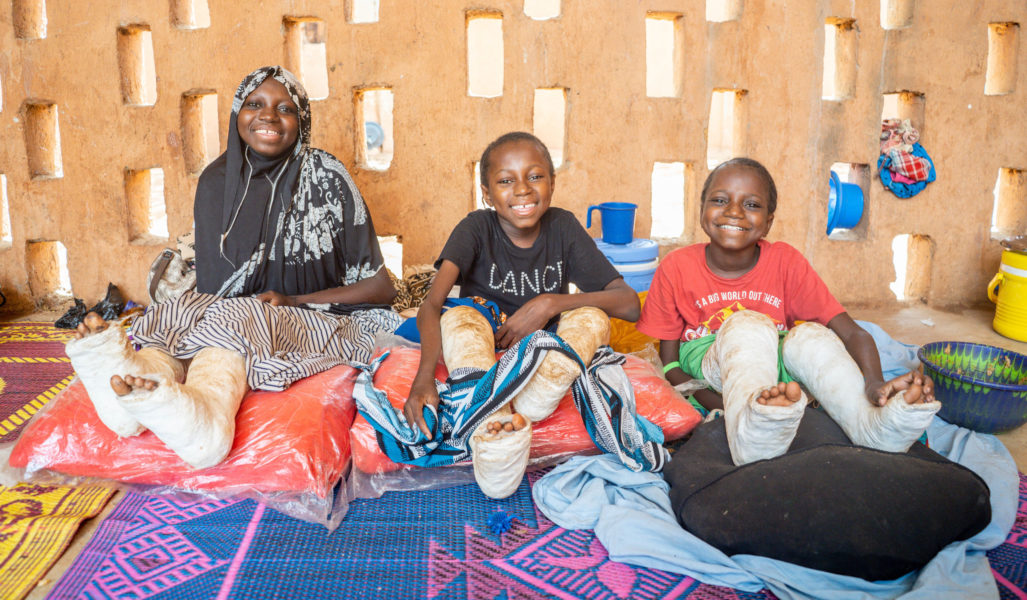From cursed to blessed, three sisters are treated for brittle bone disease in Niger
By Heidi Isaac on Thursday, July 29, 2021 at 10:56 pm“Cursed! Cursed!” is usually yelled or whispered around the corners of African rural areas about someone who is visibly sick. It is common for a child who has an obvious condition, like a burn or bent leg, to be stigmatized by the community. Similar to when the lepers in the Bible were called “Unclean! Unclean!” Safaatou, Inaya, and Farida are avoided and isolated in their village. https://www.youtube.com/embed/Tw3E71066Wo?feature=oembed
These three sisters all have a condition called osteogenesis imperfecta, also known as brittle bone disease. With this condition, bones can break or fracture easily. The eldest sister, Safaatou, already had some fractured bones right after birth, and she was never taken to the hospital. Instead, her parents opted for the traditional treatment of creating splints by putting small sticks around her ankles after she fell. Unfortunately, this practice never worked for Safaatou, and she grew up frustrated as she helplessly watched her bones curl over time. This made it harder for her to walk.
Inaya and Farida shared the same journey. They, too, suffer from soft bones that break easily and the physical pain, emotional distress, and social exclusion that comes from it. Even though they wish they did not have this condition, they are glad that they have each other to lean on. “We all know exactly what the other person is going through. We comfort and support each other,” says Safaatou.

Their mother died at a young age after contracting malaria. She passed away while she was traveling back home. Soon after, their father remarried, and the girls had to leave their home. They ended up living with their grandmother. “Nobody from the village visits us. Nobody offers us any help. Nobody cares for us!” their grandma said with a serious, aggravated look in her eyes. “I struggle to provide for them. But I cannot make the ends meet!”
Safaatou helps her grandmother provide for the family by braiding hair for local women. With the money she earns, Safaatou pays for the clothing for the entire family! Their grandmother wanted to send them to a school to learn to handcraft, but it never happened. The girls were kept inside the house due to the ever-present fear of falling and breaking their bones and because of people’s judgment.
Thankfully, the girl’s uncle took Safaatou to the Nigerian Federation of people with disabilities. Soon after, Safaatou and her sisters were visited by a CURE field agent. He told them about our services and recommended that they visit the CURE Children’s Hospital of Niger. It would be a long trip and a big commitment, but they decided to give it a try. They traveled to the hospital with a timid hope for a new start.
As of today, all three girls have been through their first round of surgeries. The operations were not easy, but they were successful! After their surgeries, both of their legs were put in casts. But the casts didn’t stop them from participating in activities with the other children at the hospital. Coloring books, learning the ABCs, and playing with other kids opened a whole new world for them! The girls didn’t feel alienated anymore. They learned what it means to be cared for and enjoyed the warmth of an embrace and smiles of genuine acceptance and joy. Safaatou, Farida, and Inaya don’t have to hide inside anymore. At CURE Niger, they can be out in the open, chatting and playing with other kids. They don’t hear “Cursed!” whispered anymore — instead, they hear “Blessed!”

Jesus hasn’t stopped healing people, and people haven’t stopped needing to be healed. He did heal lepers and all sorts of infirmities. But He wasn’t only into the physical healing. Jesus was interested in transforming lives — addressing both the physical and the spiritual. People were physically healed, but they also had their emotional and spiritual lives transformed.
While the girls are healing at CURE, they are experiencing the goodness of God on many levels. The infirmities, the rejection, the abandonment, the pain, and the isolation have been replaced with healing, acceptance, laughter, hope, love.
The girls have changed and have dreams for their future. Safaatou wanted to be a tailor and help other kids to learn this skill. Farida also wants to be a tailor. She wants to be one of the best tailors in her village. With her cheerful and bubbly personality, she is bound to attract clients and make this dream a reality. Inaya dreams of mastering the art of design and sewing. She would like to help create beautiful clothing pieces too.

“I bless the Lord who brought us here to CURE. I am so happy. I can witness right now the results of the surgeries. It will enable my nieces to work one day, and all this because of CURE!” exclaimed their grandma.
Even today, there are many “lepers” in our society. People that feel ashamed and excluded because they are “different.” Jesus showed compassion towards people that society shunned. Like Him, we are also called to reach out and touch the untouchable. Safaatou, Farida, Inaya are bonded by their sisterhood and their illness, and they have all encountered Jesus’ healing and love while at CURE Niger. A love that refuses to abandon no matter what the circumstance! A love that doesn’t fade. A love that will make them get up and walk again! A love that makes them and each one of us “well”…
Article from Cure.org.
Related Articles
- Mobile Clinics Bring Ministry to the Margins
- New Surgical Center Breaks Ground at CURE Uganda
- Surgery Straightened Megertu’s Feet and Helped Other Children in Need
- CURE’s First Medical Director Given Lifetime Achievement Award
- The Doctor Is In: Dr. Moyo’s Live Webinar on Transforming Children with Clubfoot
- Expecting a Blessing: After Years of Waiting, Evance Receives Clubfoot Surgery
